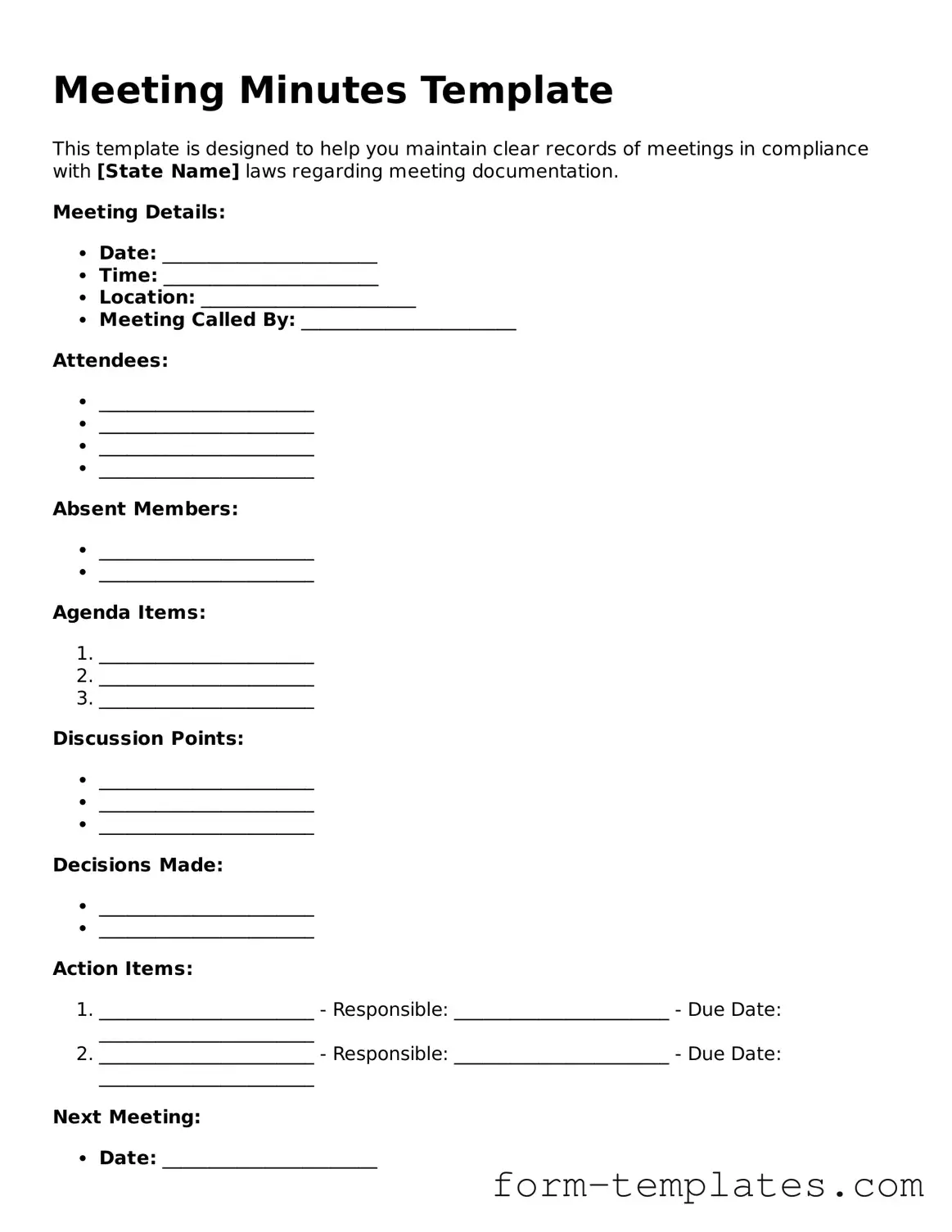Attorney-Approved Meeting Minutes Document
Guide to Writing Meeting Minutes
After gathering the necessary information, you are ready to fill out the Meeting Minutes form. This document captures key details of your meeting and serves as a record for future reference. Follow these steps to complete the form accurately.
- Date: Enter the date of the meeting in the designated field.
- Time: Fill in the start and end times of the meeting.
- Location: Specify where the meeting took place, whether it was in-person or virtual.
- Attendees: List all participants present at the meeting. Include their names and any relevant titles.
- Agenda Items: Outline the main topics discussed during the meeting. Be clear and concise.
- Decisions Made: Document any resolutions or decisions that were reached.
- Action Items: Note any tasks assigned during the meeting, along with responsible individuals and deadlines.
- Next Meeting: If applicable, indicate the date and time of the next meeting.
Once you have completed all sections, review the form for accuracy. Save or distribute the minutes as needed to ensure all participants have a copy.
PDF Form Specs
| Fact Name | Description |
|---|---|
| Purpose | The Meeting Minutes form is used to document the proceedings and decisions made during a meeting. |
| Participants | This form typically includes the names of attendees, absentees, and any guests present at the meeting. |
| Agenda Items | It lists the topics discussed, ensuring clarity on what was covered during the meeting. |
| Decisions Made | Key decisions and resolutions are recorded to provide a clear record of what was agreed upon. |
| Action Items | The form includes specific action items assigned to individuals, detailing responsibilities and deadlines. |
| Governing Laws | In many states, the requirement for maintaining meeting minutes is governed by corporate laws, such as the Model Business Corporation Act. |
| Distribution | Minutes should be distributed to all participants after the meeting to ensure transparency and accountability. |
| Approval | Minutes are often subject to approval at the next meeting, ensuring accuracy and agreement on the documented content. |
FAQ
What are Meeting Minutes?
Meeting minutes are a written record of the discussions, decisions, and actions taken during a meeting. They serve as an official account that can be referred to later, ensuring that all participants are on the same page regarding what was discussed and agreed upon.
Why are Meeting Minutes important?
Meeting minutes are essential for several reasons:
- They provide a formal record of the meeting, which can be referenced in the future.
- They help keep participants accountable for their commitments and tasks.
- They assist in tracking progress on projects and initiatives.
- They can be useful for those who were unable to attend the meeting.
Who is responsible for taking Meeting Minutes?
Typically, the responsibility of taking meeting minutes falls to a designated individual, often the secretary or administrative assistant. However, anyone can take minutes, provided they are familiar with the meeting's agenda and objectives.
What should be included in Meeting Minutes?
Meeting minutes should include the following information:
- Date and time of the meeting
- Names of attendees and absentees
- Agenda items discussed
- Key points and discussions for each agenda item
- Decisions made and actions assigned
- Next meeting date, if applicable
How should Meeting Minutes be distributed?
After the meeting, the minutes should be distributed to all participants and any other relevant stakeholders. This can be done via email or a shared document platform. It’s important to distribute the minutes promptly to ensure that everyone has the information while it is still fresh in their minds.
How long should Meeting Minutes be kept?
Meeting minutes should be retained for a reasonable period, typically at least one year. However, organizations may have specific policies regarding record retention. It is advisable to check with your organization’s guidelines to ensure compliance.
Can Meeting Minutes be amended?
Yes, meeting minutes can be amended. If an error is identified after the minutes have been distributed, it is important to correct it. This can be done by issuing a revised version of the minutes that highlights the changes made, ensuring that all parties have the most accurate information.
Fill out Popular Documents
Invoice Generator - Utilize the form to reinforce credibility with your clients.
To facilitate a smooth transition during the sale of a vehicle, it is essential to utilize the Vehicle Release of Liability form. This document not only safeguards the former owner's interests from future liabilities associated with the vehicle but also provides clarity in the transfer process. To better understand the importance and details of this form, you can visit Formaid Org for further information.
Affidavit Letter for Immigration Marriage - An official declaration supporting a spouse's petition to remove conditions on residency.
Meeting Minutes Example
Meeting Minutes Template
This template is designed to help you maintain clear records of meetings in compliance with [State Name] laws regarding meeting documentation.
Meeting Details:
- Date: _______________________
- Time: _______________________
- Location: _______________________
- Meeting Called By: _______________________
Attendees:
- _______________________
- _______________________
- _______________________
- _______________________
Absent Members:
- _______________________
- _______________________
Agenda Items:
- _______________________
- _______________________
- _______________________
Discussion Points:
- _______________________
- _______________________
- _______________________
Decisions Made:
- _______________________
- _______________________
Action Items:
- _______________________ - Responsible: _______________________ - Due Date: _______________________
- _______________________ - Responsible: _______________________ - Due Date: _______________________
Next Meeting:
- Date: _______________________
- Time: _______________________
- Location: _______________________
Minutes Prepared By: _______________________
Date of Preparation: _______________________
